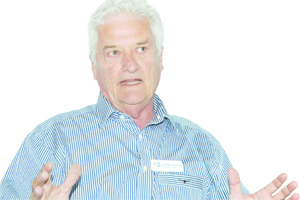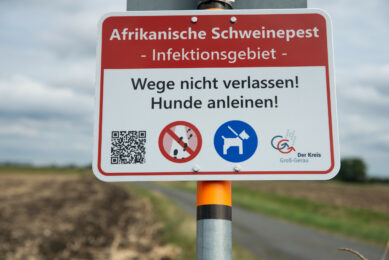Always on the lookout for unexpected results

It may sometimes be forgotten, but one of the leading pig research nations in the world is located far away from Iowa and Western Europe. For the last decade, major research has come from Australia. Pork CRC’s Roger Campbell tells about his role.
By Vincent ter Beek
Initially, it wasn’t unconditional love for pigs that drove Dr Roger Campbell to become one of the leading figures in Australian pig research. Having done an Agricultural Sciences degree at Melbourne University, his study offered a lot more variety than only diving into animal production. He says, “I had no previous experience in pigs. Still, a researcher at the time, Dr Mike Taverner, convinced me to go into pigs. He set the stage and made it sound exciting. So I went for it, did my PhD, and I have stayed in the field ever since.”
The combination ‘pigs’ and ‘research’ were never to leave his resume. When retiring from the Pork CRC in a couple of years from now, he will have been one of the most pivotal figures in Australian pig research for over a decade, as CEO of the Cooperative Research Centre for Australian Pork, located in Willaston, South Australia. For the last eight years he has constantly sought to combine the interests of Australia’s private livestock companies, public funding and research.
Describing his job as ‘providing a platform for research and encouraging very good ideas’, he has been aiming to find that research that can make the industry progress. “The fun part about this job is that you keep seeing unexpected results. Some research may not yield what you expect or turn out to be what you expect. But every now and then something very revolutionary occurs. If I can help promote that, I do my job well.”
R&D
Campbell spent most of his career in research prior to joining Pork CRC. Asked for his own revolutionary discoveries he points to his research related to dietary requirements for grower pigs. He demonstrated that growing pigs’ responses to dietary amino acids and to change in energy intake are largely independent until amino acid requirement is achieved after which all is determined by their capacity for muscle growth. He says, “The findings changed pig nutrition forever – and also the way we thought about protein and energy metabolism- it tended to make nutrition simpler.”
He also touches on a period he worked as a researcher for the United States Department of Agriculture (USDA) in Beltsville, Maryland – in the mid-eighties. Campbell speaks of ‘amazing years’ while being a member of a team doing pioneering research to the use of growth hormone (porcine somatotropin) in grow-finisher pigs. In trials, spectacular improvements in growth rate and efficiency were achieved and it was possible to answer questions that previously existed as concepts only. Campbell says, “These were amazing years. We had access to highest technology, plenty of funds – and paved the way for further exciting research and commercial application in the years to come. In addition, I met many good colleagues over there.”
Basis
In short, Campbell was the right man on the right place to give Australia’s pig research a boost, when the first Pork CRC was set up in 2005.
He explains, “At that time, research in Australia needed to be restructured and reinvigorated – and so we did. The first Pork CRC focused on enlarging efficiency and technology of pig production. Nowadays we are more focused on finding ways of adding value to the industry.” Looking back to the years from 2005 to now, he states: “I think Australia now has a pig R&D structure and environment which is second to none.”
The recent conference of the Australaisan Pig Science Association, held in November 2013 in Melbourne, may testify to that. About 50 recent scientific contributions from the Pork CRC alone were presented.
Future research
Campbell has a clear idea what themes will dominate the global pig research agenda in the years to come: Welfare, feed and animal health.
He says, “I was never a big advocate of animal welfare myself, to be honest, but if you see what impact it has been having nowadays, with retailers demanding change and often willing to pay for high welfare pork, you can not deny it will continue to have impact. This shift in research focus and industry needs, led to the establishment of the CRC for High Integrity Australian Pork in 2011.”
“On the feed side there is always going to be a big room for improvement as well. There is worldwide an ongoing shortage of feed for animal agriculture, and every now and again producers have to leave the business due to high feed costs. There should be an emphasis in the search for alternative feed sources. In this respect, no technology should be disregarded – including GM (genetically modified, ed.) grains and other ingredients if they markedly increase supply and/ or enhance efficiency.”
“We should also not forget animal health in sows and their progeny. This is one of the biggest constraints for fully achieving the potential that is created by progress in genetic science.”
Future
Until 2016, in his last two remaining years as CEO, Pork CRC will gradually prepare for a move away from receiving government support.
Campbell explains, “Current rules mean CRCs are funded for a maximum of 15 years by government. This will mean that Pork CRC is soon going into a transition, as we will need to develop a new innovation model. Funding needs to come from elsewhere, e.g. from IP income and industry participants. The Pork CRC finishes in 2018-2019. It is likely that a younger person will be found to direct the new entity – I’m getting too old for this.”
BIOGRAPHY
Dr Roger Campbell has a PhD in nutrition and physiology from Melbourne University and is currently the CEO of the CRC for High Integrity Australian Pork (Pork CRC), an organisation funded by the federal government and private investors including Australia’s three largest pork producers. The Pork CRC supports innovation and undergraduate and postgraduate training in animal welfare particular as it applies to gestating and lactating sows and their piglets, alternative animal health strategies and diagnostics, healthy pork consumption and carbon reduction. Campbell has worked as a research scientist in nutrition and growth and development with the Victorian Department of Primary Industries (1972-1988), the USDA in Beltsville, MD (1986-1987) and as the general manager of technical services with Australia’s largest pork production company (Bunge Meat Industries, now Rivalea Australia, from 1988 to 1999). He was also CEO of Ausgene, a company founded on Australian genetics based in Bloomington Illinois (1999-2005).











